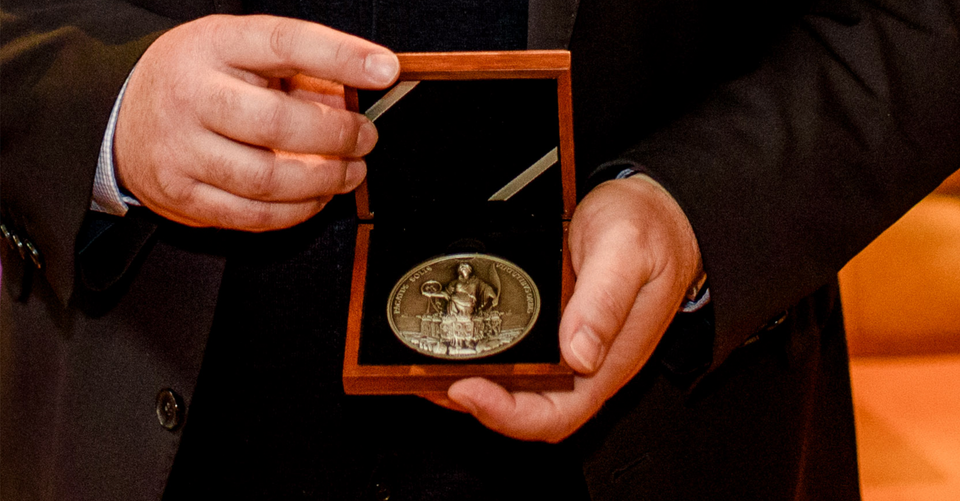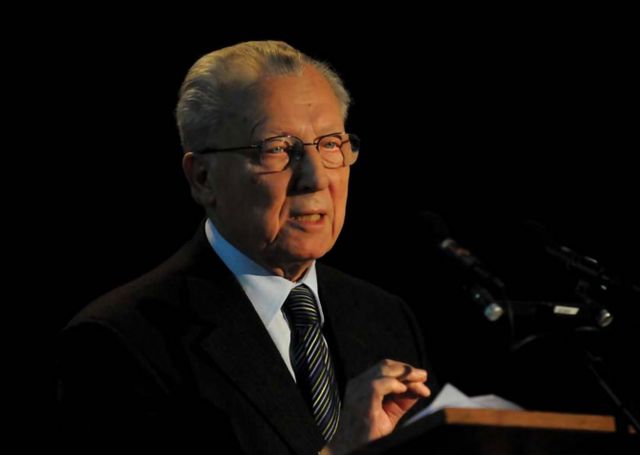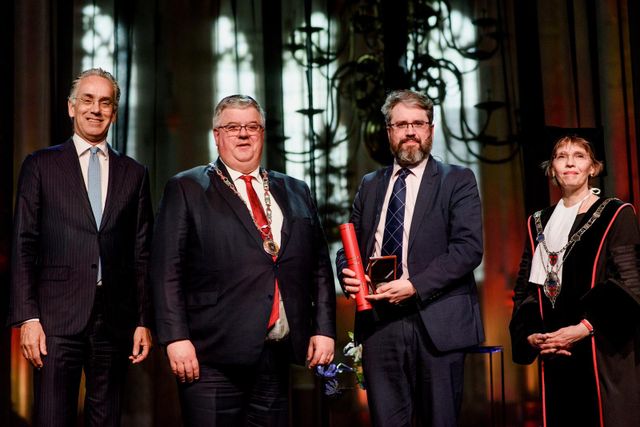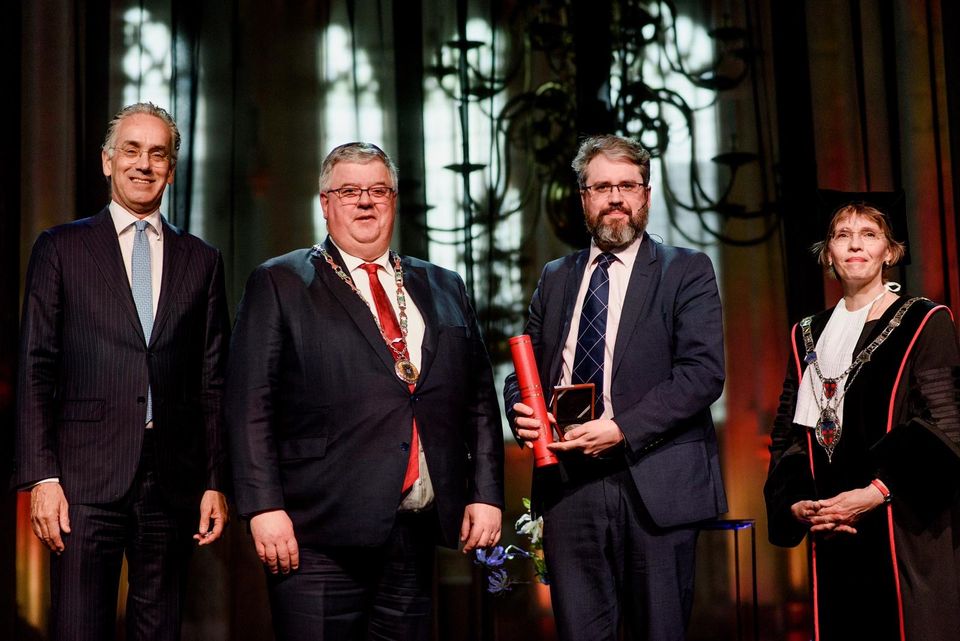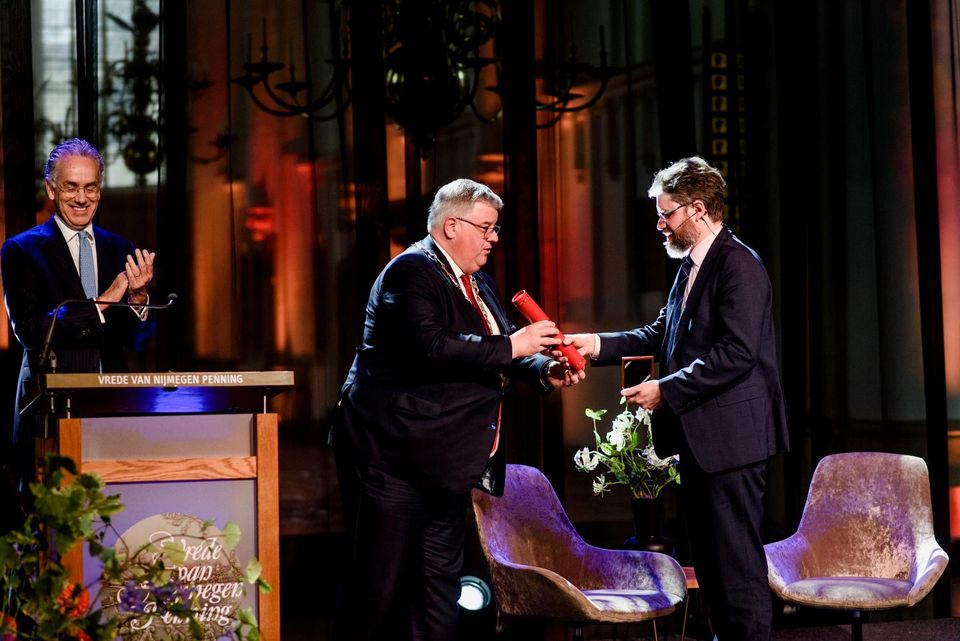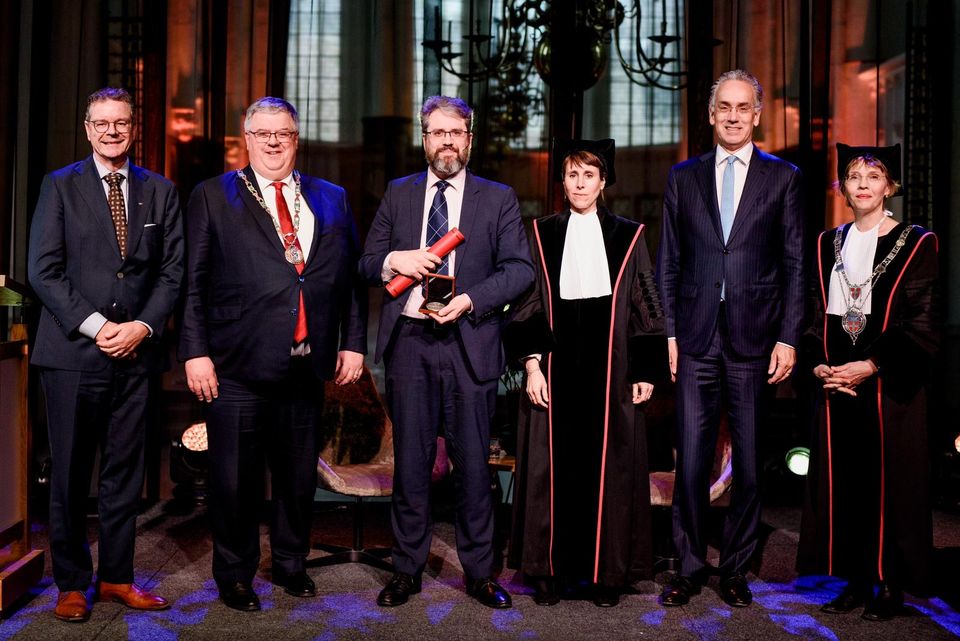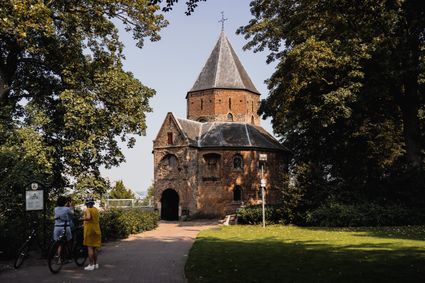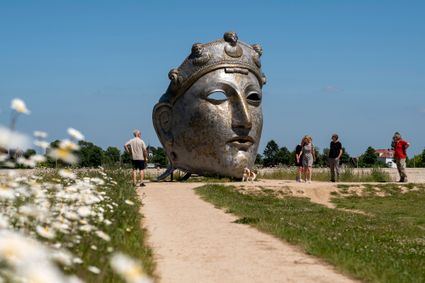Treaties of Nijmegen Medal
The Treaties of Nijmegen Medal is awarded every two years to a person or an organisation that has made a special contribution in politics, science, economics or culture to the development and position of Europe, or has made a contribution to European peace, tolerance and/or mutual respect between European citizens.
Treaties of Nijmegen Medal 2024 for Bellingcat founder Eliot Higgins
The 2024 Treaties of Nijmegen Medal will be awarded to the British founder of the international investigative journalism collective Bellingcat, Eliot Higgins. He will receive this award for his innovative contribution to peace and human rights. The medal will be awarded in Nijmegen's Stevenskerk church on 18 April 2024, after which Higgins will deliver the Treaties of Nijmegen Lecture.
The Bellingcat international network of journalists and citizen journalists has been innovatively using public data and images to uncover the truth about crimes, human rights violations, and abuses in conflicts and wars since 2014. Founder and citizen journalist Eliot Ward Higgins (born in 1979) previously wrote as a blogger and citizen investigative journalist under the pseudonym of Brown Moses. He mainly uses open data and social media channels for his investigations into abuses. In 2015, he received the Hanns Joachim Friedrichs Award, a German award for excellence in journalism.
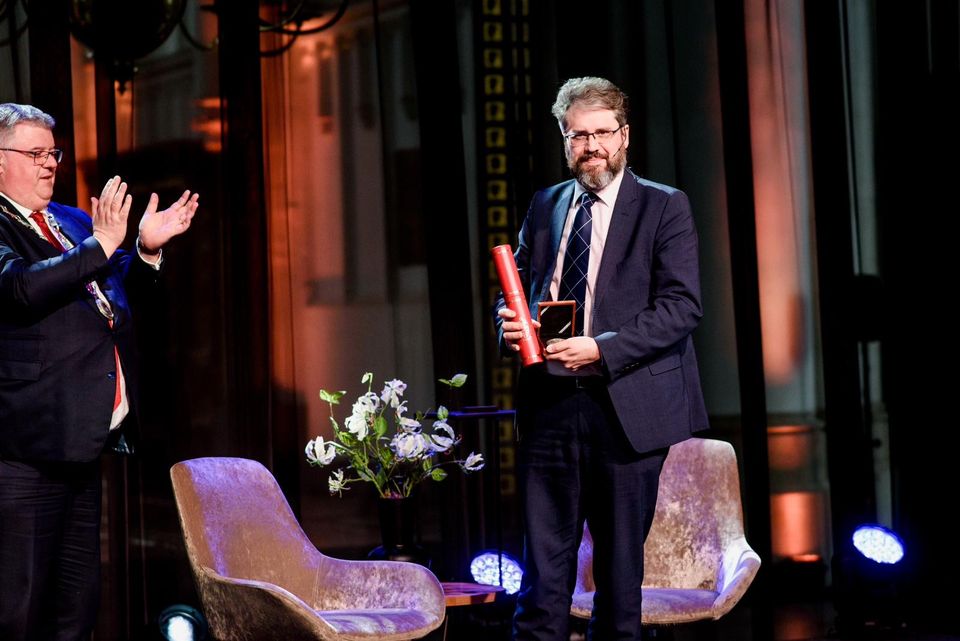
Laureates
2010 - Jacques Delors
Jacques Delors is the first laureate to receive the Treaties of Nijmegen Medal. The former chairman of the European Commission (1985-1995) was awarded the medal for his efforts in achieving European unity.
Jacques Delors strove to remove European national borders, as he believed economic integration would pave the way for European unity. Delors not only focused on the economic dimensions of European unity, but also on the social cohesion of Europe and the promotion of solidarity between the richer and poorer areas of Europe.
But perhaps Delors played his most important role right after the fall of the Berlin Wall on 9 November 1989. He succeeded in turning German and French interests into European interests. He then prepared the Maastricht Treaty (1991), which contained a resolution on the introduction of the Euro and agreements regarding a common foreign policy administered by the European Council.
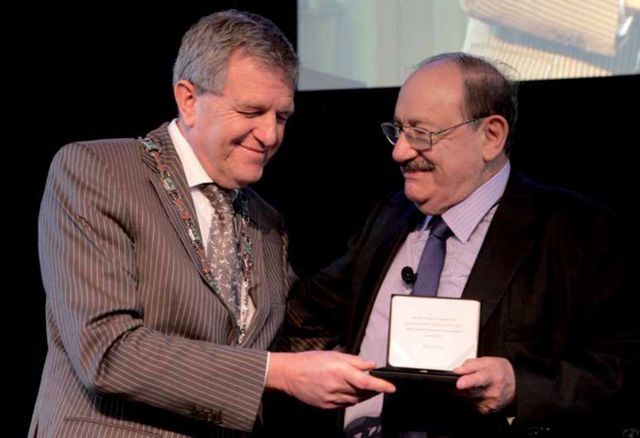
2012 - Umberto Eco
On 7 May 2012, the Treaties of Nijmegen Medal was presented to Umberto Eco. The award served as a tribute to the Italian author and scientist for his contribution to the thinking and the debate on the past and future of Europe. Umberto Eco’s contribution consists of influential literary works which were published in almost every European language, and in which he searched for a single European language.
In his contribution to the project ‘Old Europe, New Europe, Core Europe’, Umberto Eco argued that the unification of Europe is inevitable. In his speech, Mayor Dijkstra called Umberto Eco ‘a true European’, while Minister of European Affairs Ben Knapen singled out Umberto Eco in his laudatory speech as a ‘a source of hope – hope for the future of a united and prosperous Europe’.
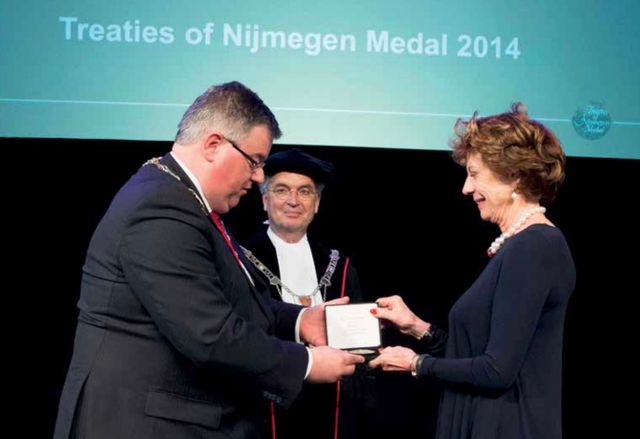
2014 - Neelie Kroes
The third Treaties of Nijmegen Medal was awarded to Neelie Kroes. She received this in recognition of her contributions to the development and prosperity of Europe. The medal was presented on 7 May in St. Stevenskerk in Nijmegen. Following the award ceremony, Neelie Kroes gave the Treaties of Nijmegen address.
With wit and decisiveness, Kroes has committed herself to Europe. As European Commissioner, she prepares the continent for the digital future. She supports innovation and high-speed internet for all Europeans. Under her guidance, Europe has invested in the production of faster, more advanced, and cheaper chips, which has helped to lay the foundation for new technological developments. She does so with the understanding that ICT technology can bring people together, improve lives, and is of great economic importance.
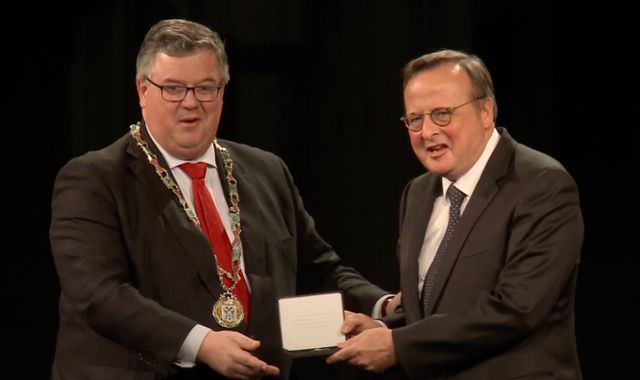
2016 - European Court of Human Rights
On November 18 2016 the Treaties of Nijmegen Medal was awarded to the European Court of Human Rights for its contribution to the development of Europe and the protection of human rights.
The European Court of Human Rights has been responsible for safeguarding human rights in Europe since 1959. It was the very first international legal institution to which individuals could complain about human rights violations, and which was empowered to deliver binding rulings on the European states.
The primary function of the Court is to offer redress to individual victims whose rights have been breached. It raps the knuckles of states that impose degrading prison conditions, in the event of disappearance and torture during civil war, police violence, or politically motivated imprisonment. In addition, the Court tackles difficult questions relating to fundamental rights in today’s society, such as the rights of refugees and immigrants, data protection and discriminatory remarks made by politicians.
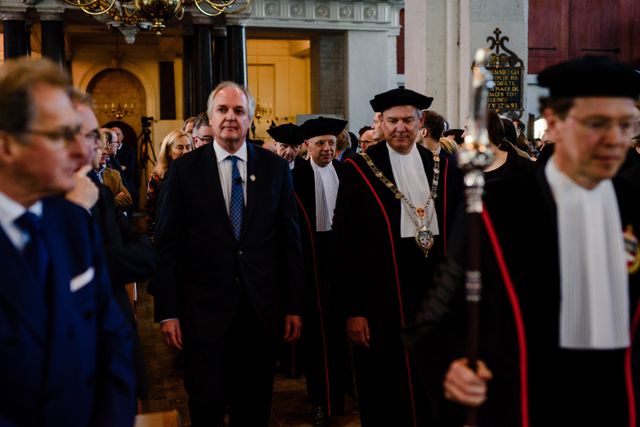
2018 - Paul Polman
On 5 April 2018 the Treaties of Nijmegen Medal was awarded to Paul Polman, CEO of Unilever. He received this in recognition of his contributions, on a national and an international scale, for a greener and more sustainable living environment.
Following the award ceremony, Polman gave the Treaties of Nijmegen address.
‘..trust is what binds any society together. Business has to step-up. It cannot be a bystander in a system that gives it life in the first place. People rightfully expect business to be an agent of change.’
Due to the measures to prevent the spread of the coronavirus the Treaties of Nijmegen Medal has not been awarded in 2020.
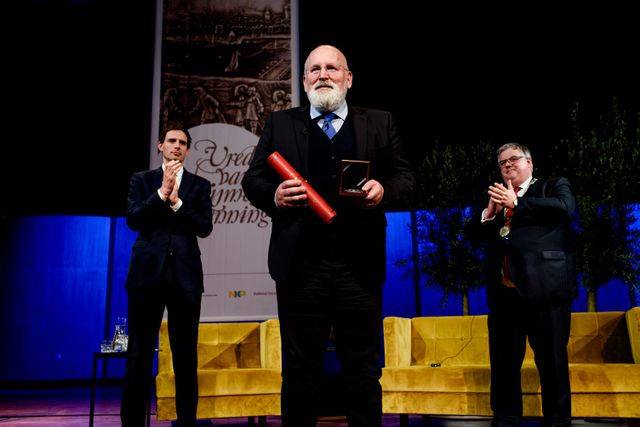
2022 - Frans Timmermans
The 2022 Treaties of Nijmegen Medal has been awarded to Frans Timmermans for his commitment to peace and cooperation in Europe. Timmermans was presented with the medal in the Radboud University Auditorium on 12 May 2022.
Frans Timmermans is a staunch proponent of the rule of law and has spent years advocating the importance of international cooperation and the role of international institutions in solving problems. He has also campaigned for solidarity, gay rights, diversity, equality for women and the protection of human rights activists. As a member of parliament, Timmermans was already closely involved in European developments. He was a member of the European Convention responsible for drafting the European Constitution. Frans Timmermans currently serves as Vice President of the European Commission and is involved in the Green Deal, which aims to mitigate the effects of climate change on the European level.
2024 - Eliot Higgins
The Peace of Nijmegen Medal 2024 was awarded to the British founder of the international investigative journalism collective Bellingcat, Eliot Higgins. He received the award for his innovative contribution to peace and human rights.
History of the Treaties of Nijmegen
In 1672, a coalition consisting of England, France, Cologne and Münster invaded the Republic of the Seven United Netherlands. This ‘catastrophic year’ marked the end of the period of economic expansion. In 1675 the warring factions wished to select a city where a peace treaty could be signed to end the various wars raging throughout Europe. The English throne selected Nijmegen. From 1676 to 1679, Nijmegen was the location of treaty negotiations. The term ‘Treaties of Peace of Nijmegen’ refers in an international context to a series of interrelated treaties ending the Franco-Dutch War, which were signed in Nijmegen in 1678 and 1679.
Read more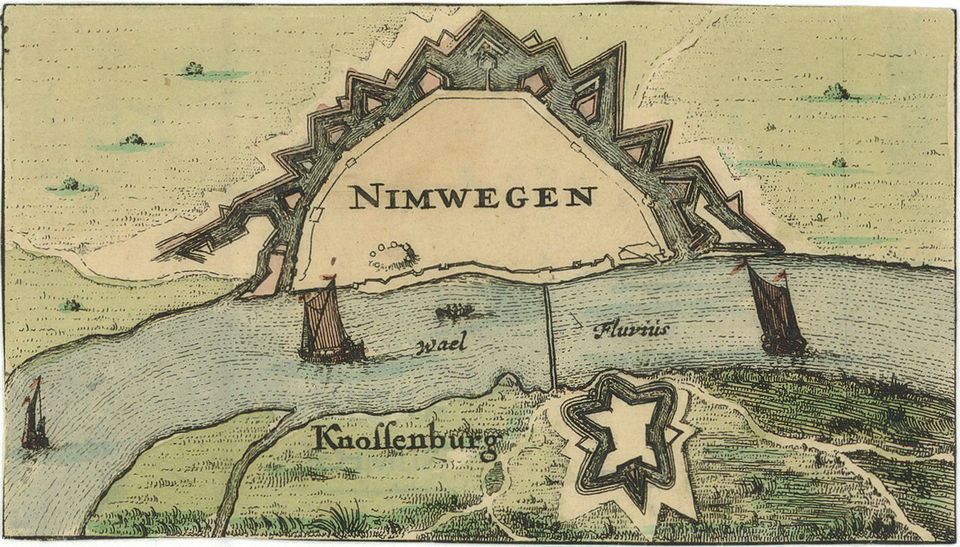
Initiators
On the initiative of the Municipality of Nijmegen, Radboud University and Royal Haskoning, and supported by the Ministry of Foreign Affairs, the medal was presented for the first time in 2010 to Dr J. Delors. In 2012, the medal was presented to Professor Umberto Eco. After this presentation, NXP Semiconductors took over the role of Royal Haskoning as partner.
Inspired by the peace treaties that were concluded in Nijmegen in 1678 and 1679 and which represented a step towards peace in Europe, the initiators of the Vrede van Nijmegen Penning want to stimulate and inspire thinking about the future of Europe. By doing so, they show that Nijmegen, as the oldest city in the Netherlands, feels connected to the future of Europe.
